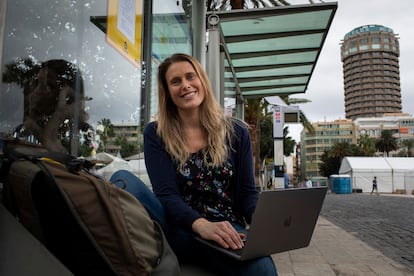Not just a tourist destination: Why Spain’s Canary Islands are hoping to attract 30,000 remote workers
In a bid to mitigate the economic fallout of the coronavirus pandemic, the regional government is investing €500,000 in a campaign to lure Spanish and international home-workers to the archipelago for long-term stays


Liz Clitheroe is going to be one of the few British residents who spend the rest of the year in Spain’s Canary Islands. The 35-year-old Briton arrived last Monday in Gran Canaria to escape England’s second home lockdown, which came into effect last Thursday, as well as the country’s winter season. The difference is that unlike most British visitors to the archipelago, she has not come for a vacation, but rather to work remotely. “My company gives me the freedom to work wherever I want, so a friend and I have come with our laptops instead of remaining locked up in London,” she tells EL PAÍS by phone. She does not expect to return to the UK until January.
Clitheroe is a marketing manager at Arkose Labs, a company based in San Francisco in the United States that focuses on preventing internet fraud and fighting spam email. She is just the kind of person the Canary Islands’ regional government and local businesses are trying to attract to the archipelago: qualified workers, associated with the tech industry and with a high purchasing power who could help support the local economy between the tourism seasons and build local talent in the so-called knowledge economy.
“Before the pandemic hit, this was barely a business niche,” says Nacho Rodríguez, who owns several co-working spaces and is an executive member of Repeople (previously Nomad City), which claims to be the largest remote-working event in Europe. “There were a lot of freelancers, many entrepreneurs who could work wherever they wanted and some workers of a few pioneering companies that had introduced remote working,” he says. The coronavirus pandemic, which saw teleworking prioritized in a bid to reduce contagions, changed this completely. “Now it has become mainstream, almost overnight.”

Meanwhile, hotels and tourist apartments in the Canary Islands continue to languish despite being added to Germany and Britain’s list of safe travel destinations due to its improved epidemiological data. The Canary Islands has the lowest incidence rate in Spain – its 14-day cumulative number of coronavirus cases per 100,000 inhabitants stands at 37, compared to the national average of 236. The region’s tourism industry, which has been devastated by the pandemic, was expecting to rebound in time for its winter high season, but these hopes have been dashed by the second home lockdown in England ordered by the government of British Prime Minister Boris Johnson as well as the spike in coronavirus cases in Germany.
BBVA Research estimates that the Canary Islands will be the Spanish region hardest hit by the economic fallout of the coronavirus pandemic after the Balearic Islands. According to BBVA, the region’s gross domestic product (GDP) fell 21% in September with respect to the same month in 2019. The tourism sector – which made €16.1 billion in 2019, according to the public association Promotur – estimates that just 15% of hotel establishments were open in the islands in October, with average occupancy forecast to be below 25%. This means that total hotel occupancy is likely have fallen below 10%.
The fall in tourism is a big concern of Yaiza Castilla, the regional chief of tourism, industry and trade. In a bid to compensate for the loss in tourists, her department has launched a €500,000 international campaign aimed at attracting 30,000 remote workers. This is a conservative figure, say industry experts, who argue that the line of business could be a more viable alternative to the traditional tourism sector. “The workers we are aiming for have much higher purchasing power than the average tourist and would spend a lot more. And that’s without causing the impact of mass tourism,” says Rodríguez, who uses as an example workers from Google, Facebook, Microsoft and Salesforce, four companies that have allowed remote working in different ways and have announced plans to make it permanent in different formats. According to figures from Repeople, their 372,000 workers have an average yearly salary of €114,000 and a yearly spending capacity of €42.4 billion, which is equal to 90% of the Canary Islands’ GDP.
Coworking spaces
The demand for co-working – which allows workers from different companies to share an office space – has grown “exponentially” in the archipelago, according to Rodríguez from Repeople. “The spaces are full or filling up, which is just the opposite of what is happening in the professional tourism sector,” he says. According to estimates from the Canary Collaborative Spaces Association (ACEC), there are 90 coworking spaces in the Canary Islands, and each one has space for an average of 20 workers. “Attracting people is easier than attracting businesses,” adds Rodrígeuz, who says the region’s main rival in this sector is Lisbon, Portugal.

“Before the pandemic, we were already seeing this segment, but the pandemic has made it more palpable,” says Castilla. “And it is a segment that has not been explored in the archipelago up until now.” The regional tourism chief says there are many reasons why the Canary Islands is an attractive destination for remote workers. “Firstly, apart from the obvious, which is the climate, there is the quality and rhythm of life, our open and hospitable character, distances are short, and we are relatively close to Europe. What’s more, we have one of the lowest costs of living in the EU and we even have fiscal instruments that are favorable to setting up a business.”
Quality of life
Tomas Rehor, a computer engineer from Czech Republic, was attracted to the Canary Islands by the idea of living “at a short distance from the beach and the country.” The 40-year-old used to work in Prague for Pipedrive, a company based in Estonia that develops CRM cloud systems. But then his country saw a sharp spike in coronavirus cases. In the last two weeks, the Czech Republic has had the second-highest incidence rate in the European Union – its 14-day cumulative number of cases per 100,000 inhabitants stands at 1,586. Only Belgium has worse figures.
Faced with this situation and the approach of winter, Rehor traveled to Gran Canaria three weeks ago, with his wife, who is on maternity leave, and two sons – aged nine and nearly two. “I traveled a lot for my work,” he explains in a video call. “But I have taken advantage of the situation and this is the first time that I have brought the family.”

The initial plan was to stay in Agaete, a small fishing village 40 minutes from the capital. “But between there being no tourists and the pandemic, the apocalyptic feeling convinced us to go to Las Palmas de Gran Canaria,” explains Rehor.
The engineer describes the capital of Gran Canaria, also known as Las Palmas, as a “multicultural” city – it is the ninth-largest in Spain, with nearly 380,000 inhabitants. “I work in a remote office and almost no one there is from the Canary Islands. I have met a lot of people in the same situation as me,” he says. This is another one of the benefits that is hoped to attract remote workers to the region.
“What really makes the destination attractive is that it creates a community that attracts other workers,” says Castilla.

“It is not just the beach or the climate,” adds Rodríguez. “Madrid and Barcelona are not only interesting because of the activities on offer, but also because of the people you meet. It’s the same with remote work: if a destination is able to attract 5,000 workers, 5,000 more will probably come because there are activities, events, networks of contacts.”
Rehor says that he still does not have a return ticket home. Nor does Carlos Rey-Moreno, a 36-year-old coordinator of policy and access regulation at the Association for Progressive Communications, an NGO present in 58 countries that aims to provide communication infrastructure to parts of the world where it is unavailable. “I lived in South Africa for three years,” says Rey-Montero. “But I felt far from everything.” Like Rehor and Clitheroe, he too has decided on the Canary Islands.
English version by Melissa Kitson.
Tu suscripción se está usando en otro dispositivo
¿Quieres añadir otro usuario a tu suscripción?
Si continúas leyendo en este dispositivo, no se podrá leer en el otro.
FlechaTu suscripción se está usando en otro dispositivo y solo puedes acceder a EL PAÍS desde un dispositivo a la vez.
Si quieres compartir tu cuenta, cambia tu suscripción a la modalidad Premium, así podrás añadir otro usuario. Cada uno accederá con su propia cuenta de email, lo que os permitirá personalizar vuestra experiencia en EL PAÍS.
¿Tienes una suscripción de empresa? Accede aquí para contratar más cuentas.
En el caso de no saber quién está usando tu cuenta, te recomendamos cambiar tu contraseña aquí.
Si decides continuar compartiendo tu cuenta, este mensaje se mostrará en tu dispositivo y en el de la otra persona que está usando tu cuenta de forma indefinida, afectando a tu experiencia de lectura. Puedes consultar aquí los términos y condiciones de la suscripción digital.








































